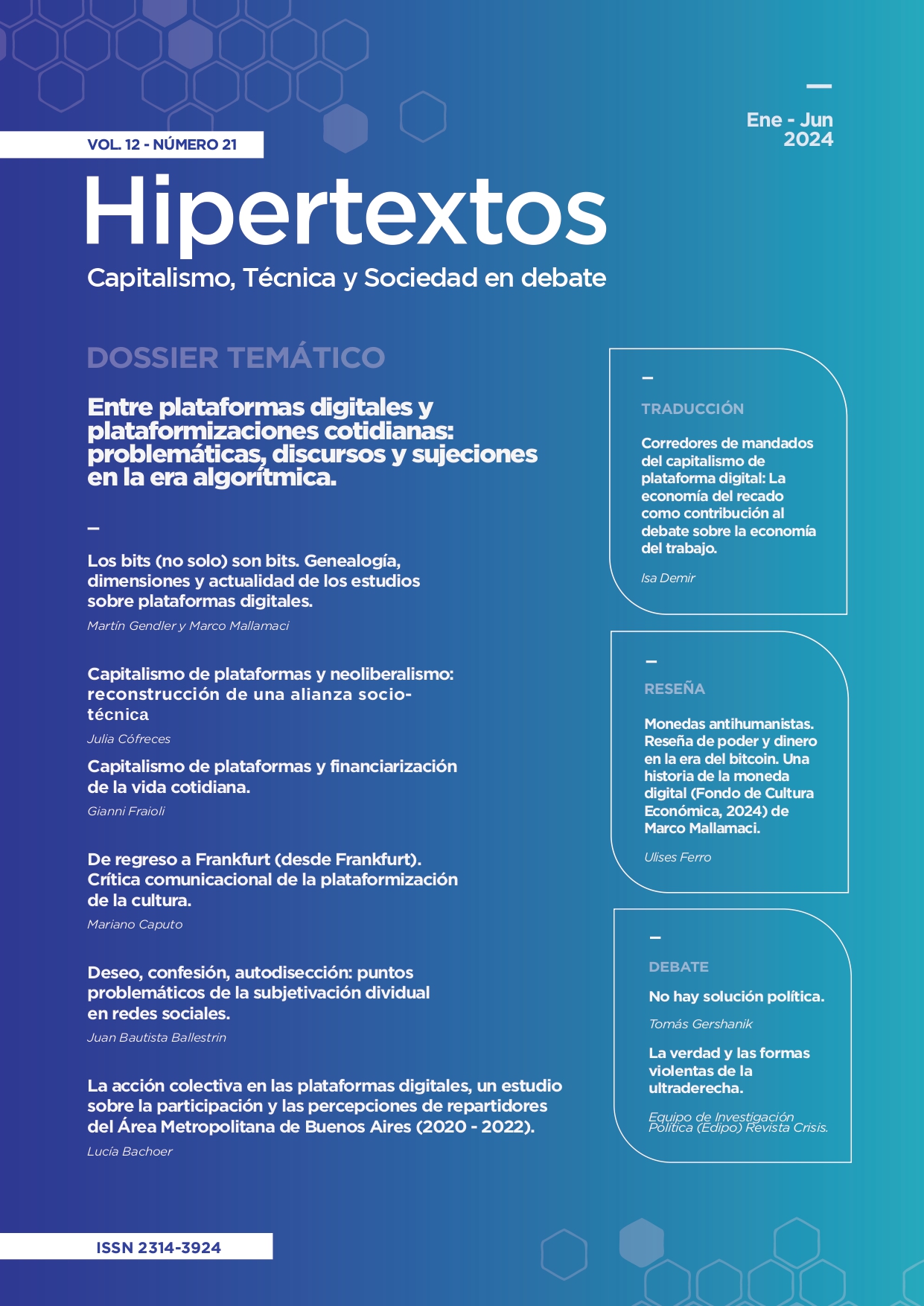Return to Frankfurt (from Frankfurt).
Communication criticism of the platformization of culture
DOI:
https://doi.org/10.24215/23143924e082Keywords:
platformization, cultural industry, technical reproduction, scrolling, subjectivityAbstract
The work seeks to articulate a theoretical reflection on contemporary platformization processes with some of the problematizations of the Frankfurt School that have attracted the attention of communication studies: the criticism of the cultural industry, the division between free time and work time. Returning to the approaches of Benjamin, Adorno and Horkheimer to think about platformization may seem like an anachronism, but here we try to demonstrate that in their reflections there are conceptual elements that allow us to come closer to understanding the forms and effects of the platformization of social life. The article participates in a trend in research that implies a movement from the discussion of platforms as “things” to an analysis of platformization as a process that affects multiple areas of life. It interrogates a particular region of this dominant process: the platformization of culture. To be even more specific, it is about exploring the relationship between advertising platforms – Facebook, X, Instagram, TikTok: “social networks”– and culture, as they extend the commodification of free time, expand the technical reproducibility of life and absorb part of the entertainment function of the cultural industry. We would like to demonstrate that the effectiveness of advertising platforms in capturing an increasingly longer lifespan is explained by the overdetermined articulation they carry out between statistics, marketing, entertainment and reproducibility. Scrolling, as a practice of algorithmic reception, constitutes the most naturalized expression of this articulation. This communication critique of the platformization of culture aims to be a contribution to the elucidation of social transformations whose course remains to be seen
Downloads
References
Adorno, T. (1973). Consignas. Amorrortu.
Adorno, T. y Horkheimer, M. (2013). Dialéctica del Iluminismo. Terramar.
Althusser, L. (1970). Freud y Lacan. Nueva Visión.
Althusser, L. (2015). Sobre la reproducción. Akal.
Bazzara, L. (2021). De embudos, filtros y brújulas: economía, técnica y subjetividad en Spotify. Revista Hipertextos, 9 (15), 47-82. https://doi.org/10.24215/23143924e028
Benjamin, W. (1982). Discursos interrumpidos I. Taurus.
Benjamin, W. (2018). Estética de la imagen. La marca editora.
Berardi, F. (2020). La fábrica de la infelicidad. Nuevas formas de trabajo y movimiento global. Tinta Limón.
Berti, A. (2022). Nanofundios. Crítica de la cultura algorítmica. La Cebra.
Caletti, S. (2019). Ariadna. Para una teoría de la comunicación. UNQ.
Caputo, M. (2024). La dimensión ideológica y subjetiva de la plataformización de la vida social. Pléyade. Revista de Humanidades y Ciencias Sociales, 32, 181-203.
Celis Bueno, C. (2019). Economía de la atención y visión maquínica: hacia una semiótica asignificante de la imagen. Hipertextos, 5 (7), 41-53.
Deleuze, G. (1999). Posdata sobre las sociedades de control. En C. Ferrer (Ed.), El lenguaje libertario. Antología del pensamiento anarquista contemporáneo (pp. 101-109). Terramar Ediciones.
Groys, B. (2014). Volverse público. Las transformaciones del arte en el ágora contemporánea. Caja Negra.
Horkheimer, M. (2007). Crítica de la razón instrumental. Terramar.
Laval, C. y Dardot, P. (2015). La nueva razón del mundo. Ensayo sobre la sociedad neoliberal. Gedisa.
Mattelart, A. (1995). La invención de la comunicación. Bosch.
Mattelart, A. y Mattelart, M. (2005). Historia de las teorías de la comunicación. Paidós.
Poell, T., Nieborg, D. y van Dijck, J. (2019). Platformisation. Internet Policy Review, 8(4). https://doi.org/10.14763/2019.4.1425
Rodríguez, P. M. y Bruno, F. (2021). The Dividual: Digital Practices and Biotechnologies. Theory, Culture & Society, 39(3), 27-50. http://dx.doi.org/10.1177/02632764211029356
Rouvroy, A. y Berns, T. (2016). Gubernamentalidad algorítmica y perspectivas de emancipación. ¿La disparidad como condición de individuación a través de la relación? Adenda Filósofica, (1), 88-116.
Romé, N. (2023). La condición cismática de la representación: lo escénico y lo inconsciente en tiempos de datificación. Aportes desde la filosofía de Louis Althusser. Enrahonar. An International Journal of Theoretical and Practical Reason, 71, 163-187. https://doi.org/10.5565/rev/enrahonar.1493
Romé, N. y Terriles, R. (2023). Lo postdictatorial. Sobre la neoliberalización del vínculo entre política, cultura y comunicación. AVATARES de la Comunicación y la Cultura, (26). https://doi.org/10.62174/avatares.2023.9018
Terranova, T. (2022). Cultura de la red. Información, política y trabajo libre. Tinta Limón.
Sibilia, P. (2013). La intimidad como espectáculo. Fondo de Cultura Económica.
Srnicek, N. (2018). Capitalismo de plataformas. Caja Negra.
Downloads
Published
How to Cite
Issue
Section
License

This work is licensed under a Creative Commons Attribution-NonCommercial-NoDerivatives 4.0 International License.
























